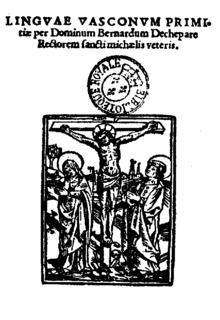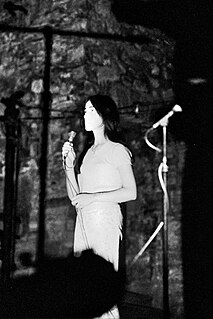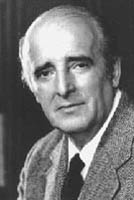 W
WAntoine Thomson d'Abbadie d'Arrast was an Irish-born French explorer, geographer, ethnologist, linguist and astronomer notable for his travels in Ethiopia during the first half of the 19th century. He was the older brother of Arnaud Michel d'Abbadie, with whom he travelled.
 W
WPedro Agerre, best known as Axular, was one of the main Basque writers of the 17th century. His main work was Gero (Later), published in 1643, an ascetic book written with elaborate prose and composed following the traumatic period of the Basque witch trials (1609-1613).
 W
WIgnacio Aldecoa was a Spanish author.
 W
WJoxe Austin Arrieta Ugartetxea is a Basque writer and translator.
 W
WYolanda Etxeberria Malaxetxeberria is a Basque writer. She completed her teaching studies in the school of teachers of Ezkoriatza, in the speciality of Basque Philosophy. After that, she studied theater at the Antzerti school and finally, she studied Cultural and Social Anthropology, at the Faculty of Philosophy and Educational Sciences of San Sebastián. Her greatest activity has always been literature, mainly as a creative writer and also conducting literary workshops and fostering a taste for Literature and Reading.
 W
WAntonio Arrúe Zarauz (1903–1976) was a Spanish politician and a Basque cultural activist. Politically he was a Carlist militant throughout all of his life; in the 1950s and 1960s Arrue informally led the Gipuzkoan branch of the party, and from 1957 to 1959 he held the official Traditionalist jefatura in the province. Form 1967 to 1971 he served in the Cortes elected from the so-called tercio familiar. He contributed to Basque culture mostly as organizer and administrator, during the Francoist era engaged especially in Euskaltzaindia. His input as linguist or ethnographer is moderate, though he excelled as one of the best Basque-language orators of his time.
 W
WBernardo Atxaga, pseudonym of Joseba Irazu Garmendia, is a Spanish Basque writer and self-translator.
Manuel Aznar Zubigaray was a diplomat in the Francoist government and one of the most important journalists of the 20th century in Spain.
 W
WJoxe Azurmendi Otaegi is a Basque writer, philosopher, essayist and poet. He has published numerous articles and books on ethics, politics, the philosophy of language, technique, Basque literature and philosophy in general.
 W
WPío Baroja y Nessi was a Spanish writer, one of the key novelists of the Generation of '98. He was a member of an illustrious family, his brother Ricardo was a painter, writer and engraver, and his nephew Julio Caro Baroja, son of his younger sister Carmen, was a well-known anthropologist.
 W
WSerafín Baroja was a Basque writer and mining engineer who wrote popular Basque poetry and lyrics. He was the father of a trio of illustrious children who left a deep mark on the art and literature of 20th-century Spain: Ricardo Baroja, painter, engraver and writer; Pío Baroja, novelist and essayist who ranks as one of the major writers of Spain's Generation of 98; and Carmen Baroja, writer, ethnologist and co-founder of the Lyceum Women's Club in Madrid.
 W
WBalendin Enbeita was a Basque Bertsolari and author. His father was Kepa Enbeita Urretxindorra, his grandfather Juan Antonio Enbeita alias Txotxojeuri.
 W
WBernard Etxepare was a Basque writer of the 16th century, most famous for a collection of poems titled Linguæ Vasconum Primitiæ he published in 1545, the first book to be published in the Basque language.
 W
WGotzon Garate Goihartzun is a Basque and Spanish writer and linguist, collector of Basque dialects, Jesuit theologian.
 W
WAlejandro "Álex" de la Iglesia Mendoza is a Spanish film director, screenwriter, producer and former comic book artist.
 W
WLourdes Iriondo Mujika was a Basque singer and writer from Spain known for helping to revitalize the Basque Language. She was born in San Sebastián on 27 March 1937 and lived in Urnieta, Spain. She is remembered as one of the most popular members of a singing group and cultural movement that renewed Basque songwriting.
 W
WArantxa Iturbe Maiz, is a Basque journalist, announcer and writer in the Basque language.
 W
WJon Juaristi Linacero is a Spanish poet, essayist and translator in Spanish and Basque, as well as a self-confessed former ETA militant. At the moment he resides in Madrid.
 W
WFederico Krutwig Sagredo (1921–1998) was a Spanish Basque writer, philosopher and politician, author of several books.
 W
WRobert Laxalt was a Basque-American writer from Nevada.
 W
WLuis Dionisio de Lezama Leguizamón y Sagarminaga (1865-1933) was a Spanish entrepreneur, vascologist and politician. As a businessman he kept developing the family-owned mining conglomerate, which controlled part or iron ore, carbon, fluorite, anhydrite and plaster exploitation in Vascongadas and Asturias. As a linguist he was a longtime executive of Sociedad de Estudios Vascos, owned one of the largest collections of Basque literature and contributed few scientific works himself. As a politician he supported the Traditionalist cause, first as a Carlist, in 1919-1931 as a breakaway Mellista, and then again as a Carlist; in the early 1930s he held the provincial party jefatura in Biscay.
 W
WRamiro de Maeztu y Whitney was a prolific Spanish essayist, journalist and publicist. His early literary work adscribes him to the Generation of '98. Adept to nietzschean and social darwinist ideas in his youth, he became close to Fabian Socialism and, later, to Distributism and Social corporatism during his spell as correspondent in London, from where he chronicled the Great War. During the years of the Primo de Rivera dictatorship he served as Ambassador to Argentina. A staunch militarist, he became at the end of his ideological path one of the most prominent Far-right theorists against the Second Republic, leading the reactionary voices calling for a military coup. Member of the cultural group Acción Española, he spread the concept of "Hispanidad" (Spanishness). Imprisoned by Republican authorities after the outbreak of the Spanish Civil War, he was killed by leftist militiamen during a saca in the midst of the conflict.
 W
WToti Martínez de Lezea is a Spanish writer who writes both in Spanish and Basque. She is a certified translator in French, English and German. She is also a television presenter and actor; she is one of the founders of the Kukubiltxo theatre company.
 W
WJon Mirande was a Basque writer, poet and translator. He lived in Paris. Mirande exerted a great literary influence in the 1970s and 1980s, writing in Basque literary and cultural magazines as well as Breton ones. His contribution was an obvious thematic renewal. He wrote poetry and short stories in his youth, and essays and novels in his later years. Mirande was a nationalist and believed in the value of ethnicity, especially in the Basque language, but he was also pagan and laid claim to the values of paganism and of the ancient Basques.
 W
WVicenta Antonia Moguel Elguezábal was a Spanish writer and translator who was the first woman to write in the Basque language. In Basque Country, she is known by the local spelling of her name, Bizenta Mogel Elgezabal.
 W
WTelesforo de Monzón y Ortiz de Urruela was a writer, politician and nationalist Basque leader.
 W
WNikolas Ormaetxea, also known as Orixe, was a Basque language writer.
 W
WRaimundo Germán Olabide Karrera, S.J. was a Basque Jesuit priest, linguistic and translator. He authored a complete translation of the Bible into the Basque language.
 W
WRamon Saizarbitoria is a contemporary Basque writer and Sociologist.
 W
WJoseba Sarrionandia Uribelarrea is a Basque writer who has published a large number of books of poetry and short stories, as well as novels. He has been awarded on numerous occasions for his work, and is nowadays a respected literary personality in the Basque Country.
 W
WAgustín Candido Tellería Mendizábal (1884-1939) was a Spanish Basque politician and entrepreneur. Politically he supported the Traditionalist cause, mostly as a Carlist and for some time as a Mellista; since 1933 he was a member of the party provincial executive in Gipuzkoa. He is known chiefly as one of key people behind the anti-Republican conspiracy in the vasco-navarrese area in the spring of 1936; thanks to his position of a businessman and army supplier, he procured arms and munitions for the rebels. In 1937 he was for 5 months the provincial Gipuzkoan leader of the Francoist state party, the FET y de las JONS, but was shortly ousted as a zealous Carlist, non-compliant with the official regime ideology.
 W
WJosé Luis Álvarez Enparantza, better known by his pseudonym Txillardegi, was a Basque linguist, politician and writer from Spain. Born in San Sebastián, he did not learn the Basque language until the age of 17, but came to be considered one of the most influential figures in Basque nationalism and culture in the second half of the 20th century.
 W
WMiguel de Unamuno y Jugo was a Spanish essayist, novelist, poet, playwright, philosopher, professor of Greek and Classics, and later rector at the University of Salamanca.
 W
WJulio de Urquijo e Ibarra, Count of Urquijo (1871-1950), in Basque self-styled as Julio Urkixokoa, was a Basque linguist, cultural activist, and a Spanish Carlist politician. As a Traditionalist deputy he twice served in the Cortes, during the terms of 1903-1905 and 1931-1933, though the climax of his political activity fell on the late Restoration period. As a scientist he was the moving spirit behind settting up numerous vascologist institutions, especially Revista Internacional de Estudios Vascos (1907) and Sociedad de Estudios Vascos (1918). Himself he specialized in Basque paremiology and bibliography. He opposed academy-driven unification of Basque dialects and preferred to wait until standard Basque emerges naturally.
 W
WAugustin Chaho in French or Agosti Xaho in Basque was an important Romantic Basque writer. He was born in Tardets, Soule, French Basqueland on 10 October 1811 and died in Bayonne, Labourd 23 October 1858. It is usually said that he studied in Paris with Charles Nodier.